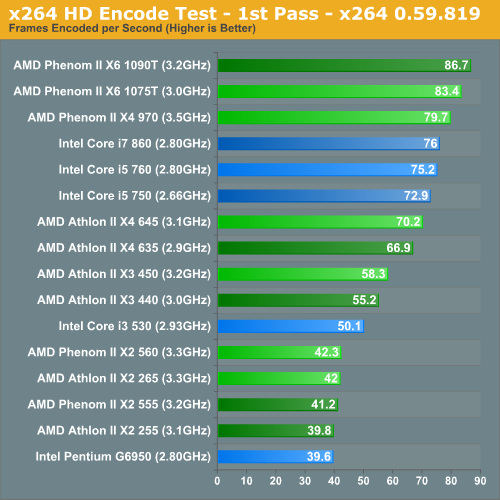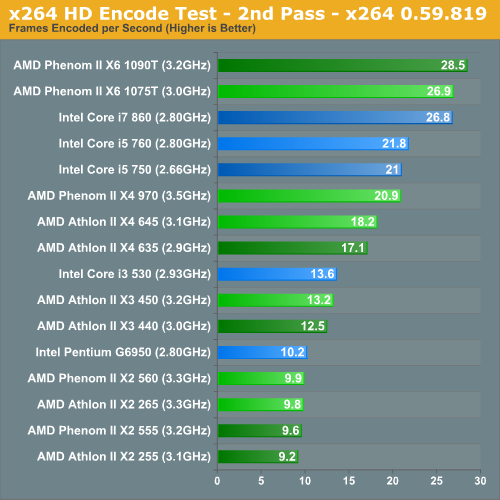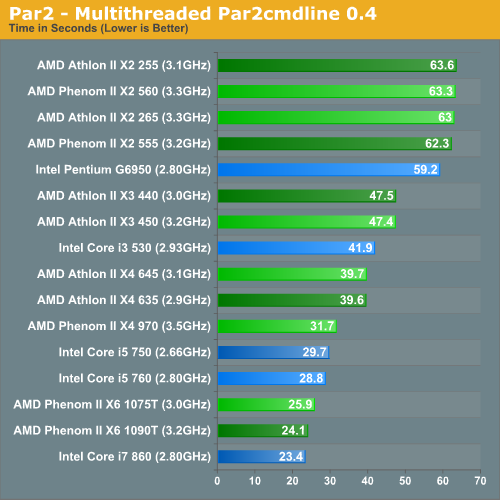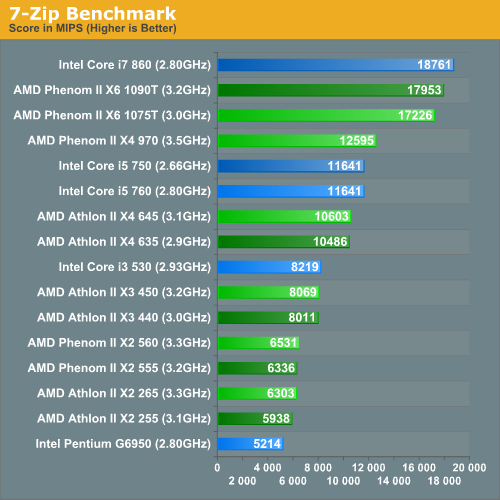AMD's Fall Refresh: New Phenom II and Athlon II CPUs Balance Price and Performance
by Anand Lal Shimpi on September 21, 2010 2:52 AM EST- Posted in
- CPUs
- AMD
- Phenom II X6
- Athlon II
x264 HD Video Encoding Performance
Graysky's x264 HD test uses x264 to encode a 4Mbps 720p MPEG-2 source. The focus here is on quality rather than speed, thus the benchmark uses a 2-pass encode and reports the average frame rate in each pass.


Video encoding performance is a definite strength of the Phenom II X6. You get comparable performance to the more expensive Core i7 860. And without Hyper Threading, the Core i5s are unable to distance themselves from the Phenom II X4 970.
Again the Athlon II X4 645 and X3 450 dominate their respective competitors.
PAR2 Multithreaded Archive Recovery Performance
Par2 is an application used for reconstructing downloaded archives. It can generate parity data from a given archive and later use it to recover the archive
Chuchusoft took the source code of par2cmdline 0.4 and parallelized it using Intel’s Threading Building Blocks 2.1. The result is a version of par2cmdline that can spawn multiple threads to repair par2 archives. For this test we took a 708MB archive, corrupted nearly 60MB of it, and used the multithreaded par2cmdline to recover it. The scores reported are the repair and recover time in seconds.

The direct comparisons we've been pointing out this entire match continue to hold as we look at different applications. The Phenom II X6 1075T performs as it should, while the Phenom II X4 970 falls short of the i5 750. The triple and quad-core Athlon IIs couldn't be better.
7-Zip Benchmark Performance
Included in 7-zip is a pure algorithm test that completely removes IO from the equation. This test scales with core count and as a result we get a good theoretical picture of how these chips perform. Note that the actual 7-zip compression/decompression process is limited to 2 threads so there's no real world advantage to having more cores.











98 Comments
View All Comments
Tanclearas - Tuesday, September 21, 2010 - link
Once again, I believe the biggest release AMD could make is the platform. I ended up going with a Q6600 a few years ago when I would have loved to choose AM2+. I have been happy with the Q6600, but I spent a lot more on it than I really wanted to at the time. I could have put together a system using a CPU that cost $200 less, then upgraded one or two years later with a significantly faster CPU.Fast forward to 2010 and the situation is quite similar. I would love to pick up an AM3+ based system with a Phenom II X4 and be ready for whatever AMD has coming. I would build that system right now, and AMD would be getting 2 CPU sales (unless things went horribly, HORRIBLY wrong with BD).
iuqidids_sm - Tuesday, September 21, 2010 - link
Is there any news about the 95W x6 cpu's, particularly the 1055? Apparently its on sale outside US, but I can't seem to find it from US based retailers. Thanks.Lolimaster - Tuesday, September 21, 2010 - link
Why don't you use 3DMax 2010 instead of an ancient version from 2005. Enough with the bias.Maybe because in this updated version Phenom II X6 perform better than any i7 quad?
bji - Wednesday, September 22, 2010 - link
I read alot of benchmark reviews. "This benchmark favors Intel" is a line I read quite frequently, and I always assume it's because compiler writers and/or software developers consciously choose to optimize for Intel chips (which makes sense since it's the larger part of the market). "This benchmark favors AMD" is not something I think I've ever read, at least not in a context that led me to believe that it's due to specific optimizations targeted at the processor. Why would 3DMax 2010 perform relatively better on Intel than 3DMax 2005 did? Is it because the newer version has been better optimized for Intel?In that case, is it more valid to use a newer version or an older version? I guess we want our benchmarks to reflect the non-benchmark software that will run on the platform, so I suppose that if most software is Intel-optimized, Intel-optimized benchmarks make sense. If not, then not.
I personally use Linux almost exclusively and I feel pretty confident that the GNU compiler toochain that is used for this operating system is not more optimized for one processor vendor than another - at least not intentionally, anyway.
In the for-money world of Microsoft and Intel with their backroom deals and shady business practices, however, I can't say for sure.
Lolimaster - Tuesday, September 21, 2010 - link
http://www.tomshardware.com/charts/desktop-cpu-cha...flyck - Wednesday, September 22, 2010 - link
I would expect Anand to have some form of moderation on this forum?Taft12 - Friday, September 24, 2010 - link
You would think they would with this new forum software, but alas....lwatcdr - Friday, September 24, 2010 - link
Slashcode does.Why do we have to waste time reading dumb stuff like this?
I agree.
but alas....
hacksquad - Wednesday, September 22, 2010 - link
I hope you stop using intel's new cpu's cause it contain AMD technology which is x86-64/AMD64 :PStaples - Wednesday, September 22, 2010 - link
I think it would be more helpful if you gave percentages when overclocking in addition to ran clock numbers. It managed 4.0GHz does not mean as much as it achieved a stable overclock of 25% vs the other processor which managed a tiny 10%. Makes comparing things a lot easier.